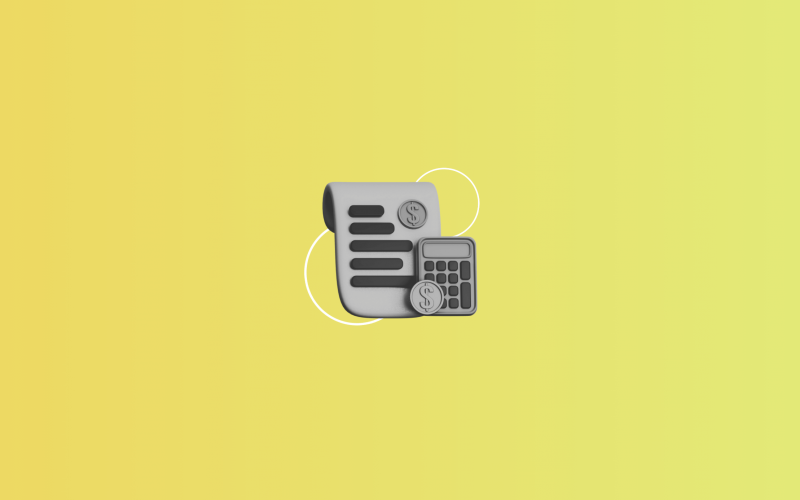Bookkeep made a name for itself by posting summarized sales data into QuickBooks or Xero – a handy shortcut for smaller sellers. But as businesses scale across multiple channels, currencies, and payout systems, that simplicity starts to show its limits.
In this guide, we’re going to take a closer look at the best alternatives to Bookkeep in 2026 – tools that offer stronger automation, reconciliation, and scalability for growing ecommerce businesses. We’ll explore why users seek alternatives and examine three main categories of solutions: integration tools such as Synder and Taxomate, mid-market accounting software like QuickBooks Online, Xero, and Zoho Books, and enterprise-grade systems like Sage Intacct and NetSuite. Let’s get started!
Why look for a Bookkeep alternative?
Bookkeep’s simplicity works for early-stage businesses, but as data complexity increases, several drawbacks become clear:
- Summary-only journal entries – Data is aggregated daily per currency, losing transaction-level detail.
- No reconciliation – Manual work is still necessary to match payouts, fees, and refunds.
- Limited mapping customization – Businesses with multiple products, channels, or tax structures need more control.
- No multi-entity or consolidated reporting – Unsuitable for businesses managing multiple brands or subsidiaries.
- Scalability issues – Higher transaction volumes can lead to delays or sync failures.
These issues lead many ecommerce and accounting professionals to switch to solutions offering full automation, reconciliation, and audit-ready accuracy.
Here are the top alternatives on the market.
Accounting automation tools
(For ecommerce sellers and accountants who need smarter data syncs, reconciliation, and automation.)
1. Synder – the best Bookkeep alternative
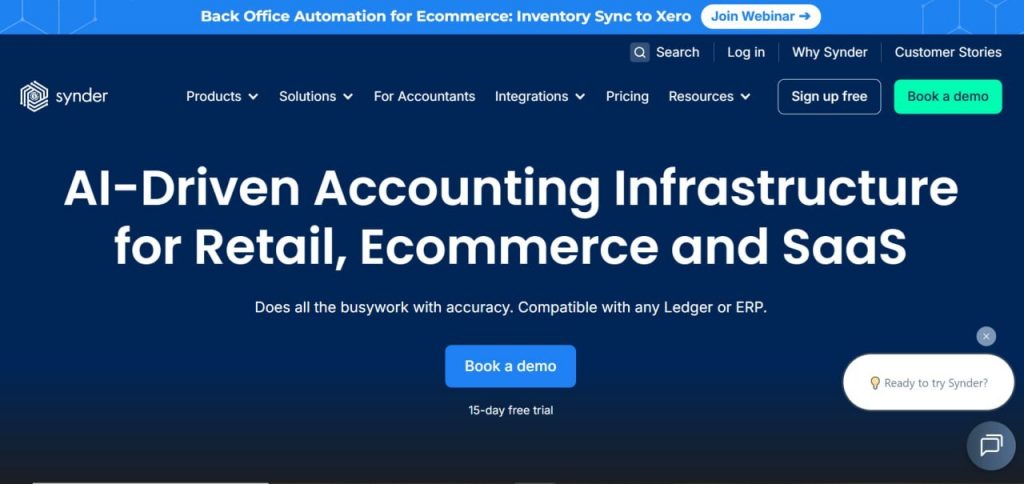
Built for: Multi-channel ecommerce, SaaS, and accounting firms needing accurate, automated syncs and reconciliation.
Synder is an accounting automation platform that connects 30+ ecommerce and payment systems (Shopify, Amazon, PayPal, Stripe, Square, TikTok Shop, etc.) with accounting and ERP software (QuickBooks, Xero, Sage Intacct, NetSuite). It automates sales, fees, taxes, and refunds posting and offers different sync modes.
Synder key features
- AI-driven accounting infrastructure – Uses intelligent mapping and pattern recognition to interpret and structure financial data automatically, learning from past transactions to improve accuracy and detect inconsistencies before they reach your books.
- Customizable data sync preferences – Choose between detailed Per Transaction syncs for full visibility or Summary Sync for a cleaner ledger.
- Smart Rules automation – Create your own logic to categorize, tag, or exclude transactions based on specific triggers, ensuring your automation matches your internal processes.
- Multi-entity support – Manage multiple brands, clients, or subsidiaries from a single dashboard, each with unique currencies, tax settings, and accounting integrations.
- GAAP-compliant and ASC 606 revenue recognition – Automates the process of recognizing deferred and recurring revenue, keeping financials accurate and compliant with accounting standards.
- Historical data import – Bring in prior years of transaction data from ecommerce and payment platforms to maintain complete, audit-ready records.
- Advanced reporting and analytics – Provides real-time profit and loss statements, balance sheets, and cash flow reports with filtering by channel, product, or location for deeper financial insight.
Synder plans & pricing
- Basic (billed annually) – from $52/month; supports up to 500 sales transactions per month.
- Essential (billed annually) – from $92/month; offers unlimited integrations so you can connect many platforms.
- Pro (billed annually) – from $220/month; includes advanced features like product mapping and bundle syncs.
- Premium – custom pricing; tailored for very high-volume or complex needs; you should contact Synder’s sales team.
Synder vs. Bookkeep: Feature comparison
| Feature | Synder | Bookkeep |
| Sync type | Summary or Per Transaction | Summary only |
| Supported platforms | 30+ (Shopify, Stripe, PayPal, Amazon, etc.) | ~10 (Shopify, Amazon, PayPal, Square, etc.) |
| Smart Rules / custom mapping | ✅ Yes – Advanced rule engine allows you to define how transactions are categorized, tagged, or excluded automatically. | ⚠️ Limited – Only basic mapping options; lacks conditional logic or automation. |
| Multi-entity support | ✅ Yes – Manage multiple clients, brands, or subsidiaries with separate accounting files under one account. | ❌ No – Only supports a single entity or company setup. |
| Multi-currency support | ✅ Yes – Automatically converts and records transactions in multiple currencies with accurate exchange rates. | ⚠️ Limited – Partial support for foreign currencies; often requires manual adjustments. |
Take a look at what real Synder users say about it: “A seamless and efficient accounting automation tool” – “Synder integrates effortlessly with multiple platforms and saves hours of manual data entry.”
Ready to save hours on reconciliation and data entry? Try Synder free or book a live demo and see how automation keeps your books clean and audit-ready.
2. Taxomate

Built for: Marketplace sellers (Amazon, eBay, Etsy, Shopify) seeking affordable, automated sales summaries for QuickBooks or Xero.
Taxomate imports settlement data from marketplaces and converts them into clean journal entries. It’s a simpler, more budget-friendly solution for sellers that don’t need detailed transaction syncs or reconciliation but want automated posting.
Key features
- Automated settlement imports from Amazon, Shopify, Etsy, and eBay
- Fee, refund, and tax handling for marketplace sales
- Quick setup with default mapping for accounting systems
- Multi-channel compatibility with QuickBooks and Xero
- Affordable and predictable pricing based on order volume
What to consider
Taxomate primarily posts summarized rather than transaction-level data, which can limit reporting detail. It’s best suited for straightforward ecommerce bookkeeping and may lack the customization or advanced automation needed for more complex accounting workflows
Taxomate plans & pricing
- Starter Plan (billed annually) – $12/month; includes up to 200 orders
- 1K Plan (billed annually) – $20/month; includes up to 1,000 orders
- 5K Plan (billed annually) – $37/month; includes up to 5,000 orders
- 10K Plan (billed annually) – $66/month; includes up to 10,000 orders
3. Dext
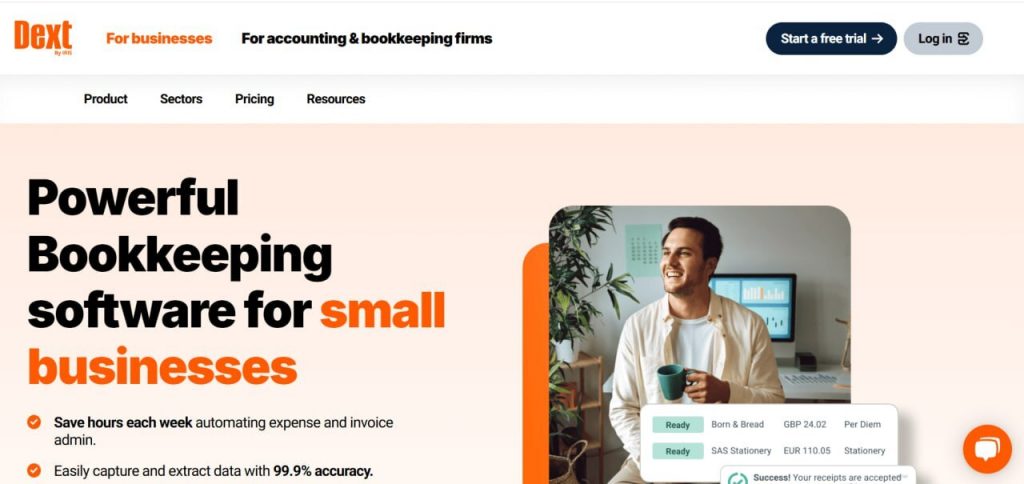
Built for: Accountants, bookkeepers, and business owners who want to automate expense tracking, receipt management, and data extraction directly into accounting software like QuickBooks, Xero, or Sage Intacct.
Dext simplifies the collection and processing of financial documents by extracting key data from receipts, invoices, and bank statements using AI-powered optical character recognition (OCR). It’s designed to save time on manual entry and ensure every expense is captured accurately and organized for bookkeeping.
Key features
- AI-powered document scanning and data extraction from receipts, invoices, and bills
- Direct publishing to accounting platforms such as QuickBooks, Xero, and Sage
- Multi-user access with approval workflows for teams and clients
- Real-time expense tracking and categorization across multiple sources
- Cloud storage and a searchable digital archive for easy document retrieval
What to consider
Dext focuses on expense and receipt management rather than full ecommerce or sales automation. It doesn’t sync product-level transactions or reconcile payment data, so businesses may need complementary tools like Synder for sales integration.
Dext plans & pricing
- Solo – £25/month (about $27); includes 1 user and up to 300 documents/month
- Business – £45/month (about $49); includes up to 5 users and 3,000 documents/month
- Premium – £85/month (about $92); includes 20 users and 12,000 documents/month
- Enterprise – Custom pricing for large firms with advanced user and document volume needs
2. Mid-market accounting platforms
(For businesses needing full accounting functionality beyond sales syncing.)
4. QuickBooks Online
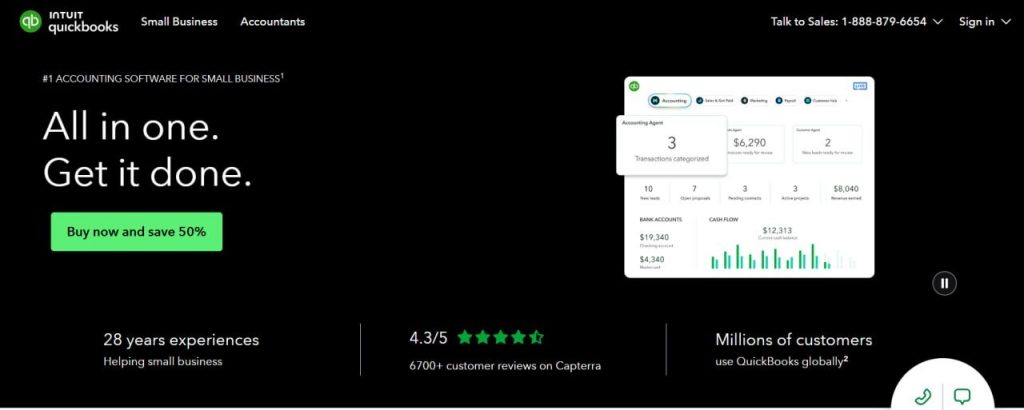
Built for: Small to midsize businesses and accountants who need a complete, reliable accounting system that integrates with a wide range of apps and automation tools.
QuickBooks Online is one of the most popular cloud-based accounting platforms worldwide. It offers end-to-end bookkeeping, expense management, invoicing, and financial reporting, all accessible from any device. With seamless integrations and tools like Synder or Taxomate, QuickBooks becomes a central hub for managing finances across ecommerce and service-based businesses.
Key features
- Automated bank reconciliation and real-time expense tracking for accurate financial records
- Professional invoicing and customizable financial reports with class and location tracking
- Budgeting tools and flexible chart of accounts to structure financial data
- Integration with over 650 third-party apps, including payroll, CRM, and inventory systems
What to consider
QuickBooks can slow down with very high transaction volumes, which may affect large ecommerce operations. Custom reporting is more limited compared to platforms like Xero or Sage Intacct. It delivers the best results when paired with automation tools such as Synder for ecommerce data sync and reconciliation.
QuickBooks Online plans & pricing
- Simple Start – $30/month; includes core bookkeeping plan with income and expense tracking, invoicing, and basic reporting for single users and small businesses
- Essentials – $60/month; adds bill management, multi-user access (up to 3 users), and time tracking for better team collaboration
- Plus – $90/month; includes project profitability tracking, inventory management, and class/location tracking for growing businesses
- Advanced – $200/month; designed for larger organizations with custom user permissions, advanced analytics, batch invoicing, and dedicated support
5. Xero

Built for: Small and midsize businesses, accountants, and finance teams that need a collaborative, cloud-based accounting platform accessible from anywhere.
Xero is a leading cloud-first accounting solution known for its intuitive design, seamless collaboration, and automation of everyday financial tasks. It provides real-time visibility into cash flow, automatic bank feeds, and integrated tools for invoicing, expense management, and reporting. With its extensive marketplace of over 1,000 connected apps, Xero easily adapts to different industries and workflows.
Key features
- Unlimited user access on all plans for seamless collaboration across teams and advisors
- Customizable financial reports and visual dashboards for clear, data-driven insights
- Integration with over 1,000 third-party apps, including inventory, payroll, and CRM tools
- Built-in bank reconciliation, invoicing, and inventory management
What to consider
The entry-level Early plan limits users to 20 invoices and 5 bills per month, making it best for freelancers or very small businesses. Advanced features like multi-currency support and project tracking are only available in higher-tier plans. For ecommerce automation, Xero works best when paired with Synder to handle detailed transaction syncs and reconciliation.
Xero plans & pricing
- Early – $15/month; includes basic plan with invoicing, bank connections, and simple expense tracking
- Growing – $42/month; adds unlimited invoices and bills with bulk transaction reconciliation
- Established – $78/month; includes multi-currency, expense claims, and project tracking
6. Zoho Books
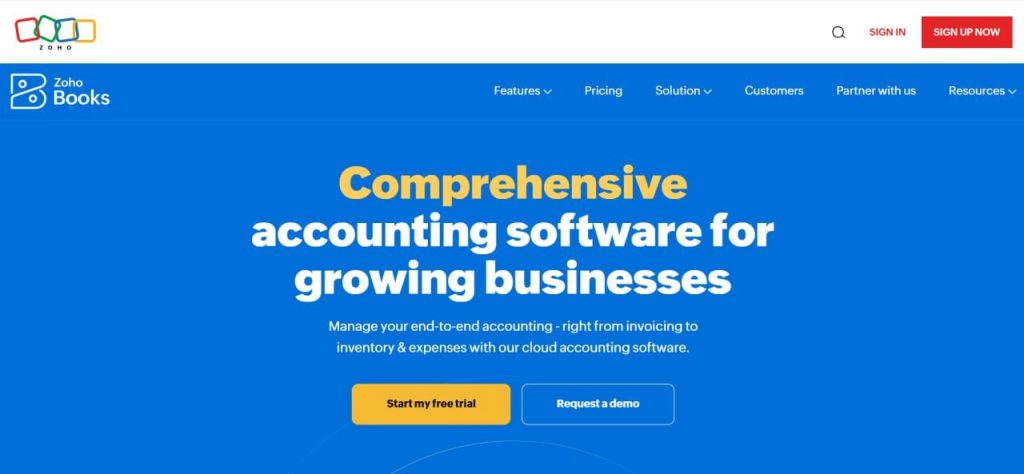
Built for: Small and midsize businesses that want a cost-effective, integrated accounting platform connected with other Zoho apps like CRM, Projects, and Inventory.
Zoho Books is a cloud-based accounting software designed to automate financial management for growing businesses. It handles invoicing, expense tracking, time billing, and workflow automation, while seamlessly integrating with the broader Zoho ecosystem. This makes it especially appealing for service-based and ecommerce businesses that already rely on Zoho tools.
Key features
- Comprehensive invoicing, expense tracking, and time billing within one interface
- Custom automation workflows and multi-level approval rules for efficient financial control
- Deep integration with Zoho CRM, Projects, and Inventory for connected operations
- Multi-currency handling, automated tax management, and detailed financial reporting
What to consider
Zoho Books offers limited direct ecommerce integrations compared to platforms like QuickBooks or Xero, often requiring third-party connectors. Some advanced accounting features, such as complex consolidations or deep automation, may be missing.
Zoho Books plans & pricing
- Free plan – For businesses earning under $50,000 annually, includes core invoicing and expense tracking
- Standard – $20/month; adds project tracking and workflow automation
- Professional – $50/month; includes inventory, purchase orders, and multi-user support
- Premium – $70/month; offers advanced analytics, vendor portal, and multi-currency support
Final thoughts: How to choose the right Bookkeep alternative
When choosing the best alternative to Bookkeep, start by evaluating your business needs: the number of sales channels you use, your transaction volume, the level of accounting detail you require, and your growth plans.
For most growing ecommerce and SaaS businesses, Synder stands out as the best overall solution. It combines flexibility, precision, and automation at every level, from detailed per-transaction syncs to AI-powered reconciliation and GAAP-compliant reporting.
Synder’s intelligent infrastructure and customizable Smart Rules let you tailor your accounting automation to your exact workflow, ensuring clean, audit-ready books across all your sales and payment platforms. Built on strong security standards, including SOC 2 Type II certification and full data encryption, Synder guarantees that sensitive financial information stays protected and compliant at all times.
FAQ
Why look for Bookkeep alternatives?
Businesses often explore alternatives to Bookkeep when they need more customization, deeper integrations, or real-time per-transaction syncs instead of summary entries. Others seek features like reconciliation, multi-currency support, or GAAP-compliant revenue recognition.
What are the best alternatives to Bookkeep?
Top Bookkeep alternatives include Synder, Taxomate, Dext, QuickBooks Online, Zoho Books, and Xero. Synder is the best choice for its flexible sync options, powerful automation, and reliable multi-channel accuracy.
How is Synder different from Bookkeep?
Synder goes beyond daily summaries by providing detailed Per Transaction or Summary Sync options, streamlining reconciliation, and offering audit-ready reporting across 30+ ecommerce and payment platforms. It ensures accuracy, compliance, and clean books every close.
How do I choose the right Bookkeep alternative for my business?
Consider your business size, number of sales channels, accounting software, and reporting needs. Choose a tool that offers reliable integrations, flexible automation, and strong support – qualities that make Synder a top choice for growing ecommerce and SaaS businesses.


